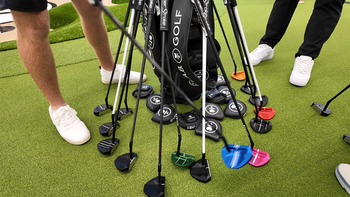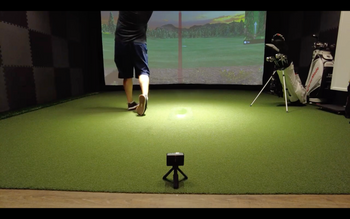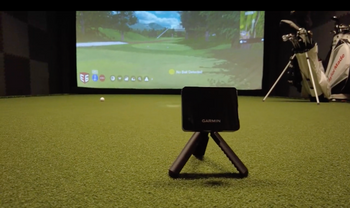You know how we're always trying to find that perfect rangefinder that doesn't feel like you're lugging around a brick? Well, I just spent a few weeks testing the Voice Caddie Laser FIT, and man, this $200 gadget totally caught me off guard.
At first, I figured it was just another compact rangefinder trying to cash in on the whole "smaller is better" trend. Couldn't have been more wrong about that one.
Here's the thing - yeah, the size is fantastic. This little unit fits in your palm like it was meant to be there, and you'll barely notice it in your pocket when you're walking 18. But that's not even the best part.
The triangulation feature? That's where this bad boy really shines. Let me break it down for you - instead of just shooting the flag and calling it a day, you can measure multiple points to figure out exactly how far you need to carry that water hazard or bunker. It's like having a caddie who's really good at geometry.
For 200 bucks, you're getting tech that used to cost way more. And trust me, when you're standing on the 15th tee trying to decide between a 3-wood and driver, knowing exactly how far that trouble is makes all the difference.
Here's how it actually works on the course. You click once to get your target distance - super fast, by the way. Then if you need to know more, like how far to clear that creek, you can triangulate between multiple points. Takes about five seconds total, and suddenly you're playing smarter golf instead of just hoping for the best.
Now, I've gotta level with you - it's not perfect. There are a couple things that might bug you, and I'd rather you hear it from me than find out after you buy it. The display could be brighter in really sunny conditions, and the battery life isn't quite as long as some of the pricier models out there.
But honestly? For a recreational player trying to break 90 or 80, those minor gripes shouldn't be deal-breakers. You're getting premium features without the premium price tag, and that triangulation ability alone will probably save you three or four shots per round once you get the hang of it.
Bottom line - if you're tired of guessing distances and want something that'll actually help you make better club selections without breaking the bank, the Laser FIT is worth every penny. Just don't blame me when your buddies start asking to borrow it every other hole.
Table of Contents
Key Features
Advanced Triangulation Technology : The Ball to Pin feature lets you measure distances between any two points on the course, perfect for calculating carry distances over hazards or figuring out yardages from blind spots - technology usually reserved for rangefinders costing $400+.
Ultra-Compact Pocket Design : At just 4 ounces and smaller than most smartphones (3.39" x 1.48" x 2.21"), this rangefinder disappears in your pocket, eliminating the hassle of walking back to your cart or digging through your bag between shots.
Instant Target Acquisition : Get your distance in a blazing-fast 0.1 seconds after pressing the button, keeping pace of play moving when you're under pressure from the group behind or need quick reads in changing conditions.
Slope-Adjusted Distances : Built-in slope technology automatically calculates elevation changes, showing both straight-line distance and adjusted yardage, so you'll know whether that uphill approach needs an extra club or two.
Smart Display Technology : The viewfinder automatically switches between black and red numbers based on background contrast, ensuring clear visibility whether you're aiming at bright sky or dark treelines behind the flag.
Voice Caddie Laser FIT
Experience the ultimate edge—Voice Caddie Laser FIT Golf Rangefinder delivers unmatched accuracy and innovation.
Design and Technology
You know how most rangefinders come in those boring boxes? Voice Caddie's doing something different here. The Laser FIT arrives in packaging that's actually pretty sharp - nothing crazy fancy, but it's got that premium feel you wouldn't expect from something under 200 bucks. The box itself is solid too, not that flimsy stuff you usually toss right away.
Here's what really got my attention though. You've probably dealt with those annoying rangefinder cases before - either those bulky zip-up pouches like Bushnell uses, or worse, those flap-over cases that don't really protect anything. I was worried the Laser FIT would come with one of those crappy flip-top cases Voice Caddie used to include with their older models.
Turns out they nailed it this time. They include a proper zip-up case, just like the industry standard ones, except it's sized perfectly for this tiny rangefinder. It's the little things, right?
Speaking of tiny - man, I totally underestimated how much the size would matter. This thing's ridiculously small, and I mean that in the best way possible.
Picture this: first round with the Laser FIT, I decided to test something out. I slipped it in my pocket without the case, just to see if it'd bug me during my swing or while walking. You've probably tried stuffing a regular rangefinder in your pocket before - it's like carrying a brick around.
Not this one. I played all 18 holes with it in my left pocket and honestly forgot it was there half the time. No weird bulge messing with my swing, no uncomfortable weight bouncing around. Just grabbed it whenever I needed a distance and slipped it right back.
We're talking 4 ounces here, and dimensions of just 3.39" x 1.48" x 2.21". That's smaller than most smartphones. The convenience factor is huge - instead of digging through your bag, unzipping a case, taking your shot, then reversing the whole process, you just reach in your pocket. It's right there when you need it.
After playing with this pocket-sized setup, I'm spoiled. Going back to a full-size rangefinder feels like a hassle now.
But here's the kicker - the compact size isn't even the best part of this rangefinder...

Advanced Triangulation at an Unbeatable Price
You know that triangulation feature everyone's been talking about? Voice Caddie labels it "Ball to Pin" on their $199.99 Laser FIT, and honestly, it's a game-changer for weekend warriors like us.
Let me break down how this bad boy works. You're standing somewhere on the course – doesn't matter where – and you point this rangefinder at your ball. Hit the button, boom, you've got that measurement. Next, you swing it toward the flag and grab that distance too. The device does some quick math and tells you exactly how far your ball sits from the target. No more guessing games.
Think about those wet days when you're stuck on cart paths. Your ball's way out there on the other side of the fairway, and normally you'd be hauling three clubs just to cover your bases. Not anymore. Park your butt in the cart, zap both spots with the laser, and you'll know whether it's a smooth 7-iron or you need to muscle an 8. One club, one trip – your back will thank you.
Ever had your ball land behind a hill where you can't see jack? We've all been there, playing blind and praying. With this triangulation thing, you just walk to any spot where you can see both your ball and the flag. Take your two measurements, and suddenly that impossible shot becomes a confident swing because you know it's exactly 147 yards, not the 160 you were guessing.
Your buddies who always "forget" their rangefinders will love you too. Instead of hiking over to each person's ball like some kind of caddie, you can stand in one spot and fire off everyone's distances. "Hey Mike, you're sitting at 135. Sarah, yours is 142." Done and done. You'll look like a wizard out there.
Here's where it gets really interesting – you're not limited to just measuring ball-to-flag distances. Want to know how far that water hazard extends past the green? Or maybe you need the carry distance over that fairway bunker? Point, click, point, click – you've got your answer. It's like having a course map in your hand, except way more accurate.
I put this thing through its paces, checking the triangulated distances against direct measurements. The accuracy blew me away – usually dead-on or maybe a yard off. Only once did I see a 3-yard difference, and that was probably user error on my part. For two hundred bucks, getting this level of precision is nuts. Most rangefinders with triangulation will set you back at least double that.
The compact size makes it easy to carry, but let's be real – the Ball to Pin feature is what makes this rangefinder special at this price point. You're getting tour-level technology without the tour-level price tag. If you're tired of pacing off distances or playing guessing games on blind shots, this little device will transform how you approach course management.
Lightning-Fast Target Acquisition
You know what nobody talks about enough with the Voice Caddie Laser FIT? The thing is ridiculously quick. We're talking blink-and-you'll-miss-it fast. Voice Caddie claims you'll get your distance in a tenth of a second after pressing the button. Can I verify that exact timing? Not really. But I can tell you it feels instant – like the moment your finger touches that button, boom, there's your number.
This crazy-fast response time reminds me why I dig the Voice Caddie TL1 so much. It's actually become one of those signature features that sets Voice Caddie's lineup apart from everybody else. And here's the kicker – you're getting this Formula 1 pit-stop speed in a rangefinder that won't blow up your credit card. We're talking under two hundred bucks here.
Now look, I'm not gonna sit here and tell you to drop your cash just because this thing spits out numbers faster than you can say "fore." The real magic happens with that triangulation tech, the compact design that actually fits in your pocket, and the price tag that won't have you sleeping on the couch. But man, when you're standing over your ball and need that yardage RIGHT NOW because the group behind you is breathing down your neck? That instant readout becomes your best friend on the course. It's like getting a cherry on top of an already solid sundae.

Standout Features of the Laser FIT Rangefinder
Let's talk about what else you're getting with the Voice Caddie Laser FIT beyond its main party tricks. You know what? For $200, it's pretty darn solid even if it won't blow your socks off.
Here's the deal with how it feels in your hands - it's not gonna win any awards for feeling premium. You pick up a Bushnell or that fancy Garmin Approach Z30, and yeah, they feel way more substantial. This thing? It's got that lightweight plastic vibe going on. But hey, you're not dropping $400+ either, and honestly? When you're stuffing it in your pocket on the 7th tee, you'll appreciate that it doesn't weigh down your shorts.
You get 6X magnification with this bad boy. The view through the lens is actually pretty crisp - way better than I expected for the price. Sure, if you've played with those premium 7X models, you might feel like you're missing something. It's like going from HD to regular TV - you notice it at first, but you get used to it. For two hundred bucks though? You're seeing everything you need to see.
Here's something cool - the numbers in your viewfinder automatically switch between black and red depending on what you're aiming at. Pointing at a bright sky? Black numbers pop up. Dark treeline behind the flag? Boom, red numbers. It's one of those features you don't think about until you use a rangefinder without it and you're squinting trying to read the distance.
And get this - you're getting slope-adjusted distances too. That means when you're staring down at that elevated green on 15, it'll tell you the actual distance AND what it's playing like with the elevation factored in. Most rangefinders under $200? They just give you straight-line distance and leave you guessing whether to club up or down.
Look, I'm not gonna sugarcoat it - there are a couple things that might bug you. But we'll save those gripes for another conversation. Right now, just know you're getting way more features than you'd expect at this price point.
No Cart Magnet: Does It Matter for Everyday Golfers?

Let's talk about something that might bug you about the Laser FIT - there's no magnet to stick it on your golf cart.
You know what though? I'm totally fine with that. Here's why. This thing is so compact, I just slide it right in my pocket and forget it's there. That's actually what sold me on it in the first place - the portability factor.
Sure, some of you might be thinking, "But wait, what about when the course makes us stay on the cart path?" Fair point. When you're stuck 30 yards from your ball and need to shoot distances from the cart, you might wish you had somewhere convenient to stash your rangefinder between shots.
Here's the reality check though. You're looking at a $200 rangefinder here. At that price point, you'd be hard-pressed to find any model that comes with magnetic mounting. Most companies save that feature for their premium models that'll run you $300 and up.
Think about it this way - would you rather have a rangefinder that costs less and fits perfectly in your pocket, or pay extra for a magnet you might never use? For weekend warriors like us trying to break 80 or 90, I'd argue the pocket-friendly design makes more sense anyway. You're getting accurate yardages without the bulk, and that's what really matters when you're trying to dial in your approach shots.
Rechargeable Battery Concerns: What You Need to Know
USB-C charging versus replaceable batteries - this is where the Voice Caddie Laser FIT might rub you the wrong way. While some folks dig having a built-in rechargeable battery, I'm not sold on it.
Look, traditional rangefinder batteries aren't cheap - you're dropping decent cash on them even though they'll last you about a year. So yeah, dodging that annual expense sounds nice.
Here's my beef though: I'm gonna space out and forget to juice this thing up. It happens to the best of us. The company says you'll get 8 hours of actual usage time, which honestly isn't shabby. Think about it - you're only zapping distances for a few seconds per shot, so that 8 hours stretches pretty far.
Nobody knows exactly how many rounds that translates to yet. Could be plenty. But picture this: you roll up to the first tee, reach for your rangefinder, and... dead. Nothing worse than that sinking feeling when you realize you forgot to plug it in last night.
Even worse? You actually remember to charge it, but then you leave the dang thing sitting on your kitchen counter. Been there, done that, bought the replacement yardage book at the pro shop.
If you're one of those organized types who keeps their gear charged and ready to roll, this whole thing's probably a non-issue. Plus, you'll save some cash by not buying those pricey batteries every year or so. Me? I know myself too well - this charging situation's gonna bite me eventually.

Our Experience
Let me tell you about the Voice Caddie Laser FIT - it's gonna catch your attention if you're hunting for a rangefinder that won't break the bank. At $199.99, you're getting serious bang for your buck.
Here's what really gets me pumped about this little guy - triangulation. You know how sometimes you're stuck between two bunkers and need to figure out the carry distance to clear both? That's where triangulation comes in clutch. This feature lets you measure between two different points to calculate distances you can't directly see. Usually, you'd have to drop $400+ to get this tech in other rangefinders. With the Laser FIT, you're getting it for half that price. Not sure if you'll actually use triangulation on the course? Well, here's your chance to test it out without emptying your wallet.
The thing that surprised me most? This rangefinder is tiny - like, fits-in-your-pocket tiny. I've been keeping mine in my front pocket during rounds, and honestly, it's been a game-changer. No more walking back to the cart because I forgot to grab it. When you're standing over your ball trying to decide between a 7-iron and an 8-iron, having instant access to exact yardages builds confidence in your club selection.
Now, I've gotta be straight with you about the downsides. The charging setup is kind of annoying - it uses a proprietary cable instead of USB-C like everything else these days. So if you forget to charge it and the cable's at home, you're out of luck. Plus, there's no magnetic strip to stick it on your cart. Some guys hate that, but personally? I prefer having it in my pocket anyway.
Look, for two hundred bucks, you're not getting the Cadillac of rangefinders. But here's the thing - you're getting features that actually help your game. Quick, accurate distances to the pin, triangulation for tricky shots, and a size that means you'll actually use it every hole instead of leaving it in the cart.
Bottom line: If you're a weekend warrior trying to break 90 (or 80), this rangefinder gives you the tools to make smarter decisions without the premium price tag. Sure, there are fancier options out there, but the Laser FIT delivers where it counts - helping you pick the right club and commit to your shots. That's what's gonna lower your scores, not some extra bells and whistles you'll never use.
Voice Caddie Laser FIT
Experience the ultimate edge—Voice Caddie Laser FIT Golf Rangefinder delivers unmatched accuracy and innovation.
Is the Voice Caddie Laser FIT Worth It?
Absolutely, while the Voice Caddie Laser FIT Golf Rangefinder is a great product, there are a few pros and cons that you need to be aware of:
Pros:
Lightning-fast distance readings in just a tenth of a second, perfect when the group behind you is waiting
Triangulation feature (Ball to Pin) typically found in $400+ rangefinders, letting you measure multiple points for smarter shot planning
Ultra-compact design (4 ounces) fits comfortably in your pocket without affecting your swing
Cons:
Built-in rechargeable battery means you're stuck if you forget to charge it before your round
No magnetic strip for attaching to your golf cart, though the pocket-size design makes this less of an issue
Display could be brighter in direct sunlight , making it harder to read on those blazing summer days
Frequently Asked Questions
How accurate is the triangulation feature on the Voice Caddie Laser FIT?
The triangulation measurements are typically dead-on or within a yard of actual distances. During testing, the biggest variance was 3 yards, which was likely user error. For a $200 rangefinder, this level of accuracy rivals devices costing twice as much.
Can the Laser FIT measure slope-adjusted distances?
Yes, it includes slope technology that factors in elevation changes. When you're facing an uphill or downhill shot, it'll show both the straight-line distance and what the shot's actually playing, helping you pick the right club.
How long does the battery last on a single charge?
Voice Caddie claims 8 hours of actual usage time. Since you're only using it for a few seconds per shot, this translates to multiple rounds of golf, though the exact number depends on your pace of play and how often you shoot distances.
What's included with the Voice Caddie Laser FIT rangefinder?
You get the rangefinder itself, a properly sized zip-up protective case (not one of those flimsy flip-top ones), a proprietary charging cable, and the usual documentation. The case is perfectly sized for this compact unit.
Is the 6X magnification enough for accurate readings?
The 6X magnification provides clear, crisp views for accurate targeting up to typical golf distances. While premium models offer 7X magnification, the difference is minimal for recreational play, and the optics quality is surprisingly good for this price point.
Conclusion
Look, after spending weeks with the Voice Caddie Laser FIT, here's my honest take - for two hundred bucks, you're getting features that'll actually help you shoot lower scores. The triangulation alone is worth the price when you're trying to figure out carry distances or shooting from blind spots, and that lightning-fast response time means no more holding up play. Sure, the rechargeable battery might bite you if you forget to juice it up, and yeah, fancier rangefinders feel more premium in your hands. But when you're standing over a 150-yard approach trying to decide between clubs, this pocket-sized buddy delivers the confidence you need to commit to your shot. If you're tired of guessing distances and want tour-level tech without the tour-level price tag, the Laser FIT is the smartest $200 you'll spend on your game this year.






